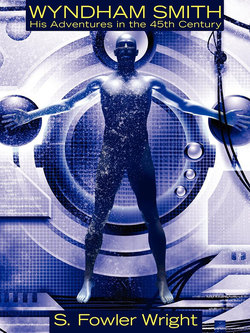Читать книгу Wyndham Smith - S. Fowler Wright - Страница 9
На сайте Литреса книга снята с продажи.
ОглавлениеCHAPTER SEVEN
“I am not Colpeck-4XP. I am Wyndham Smith.” So he told himself a score of times as he paced his room during the night, sometimes in explanation, sometimes in self-excuse, sometimes in the endeavour to mould desire to the point of settled resolve.
Yet it was hard to realise, if not to believe. Its truth was evident in the fact alone that he was awake and disturbed with conflicting thoughts. Every memory, every tradition of conduct, every argument with which his mind was stored was on the side of the race to which he was otherwise so remote, yet which, by one irrevocable word, had become his in its hour of death.
He saw that he had three questions to vex his mind, of which he must dispose in an orderly rotation:
(1) Did he really intend to survive the general race-suicide which he had been solitary to oppose?
(2) If so, did he wish Vinetta to be his wife in the future days?
(3) If he did, was there any possible method by which she could escape the common fate, after she had consented thereto?
He saw that, if he should answer the first question in the negative, the other two did not arise, and that it should therefore have prior consideration. Similarly, if the second should be negatived, the third need not be asked, and that was further evidence that he had numbered them rightly.
Yet their precedence was less simple than that, for, had the first stood alone, he would have had a week for its leisured consideration, whereas an affirmative answer to the second might entail prompt action in various ways, so that, for its sake, the prior question must be promptly resolved.
Again, the reply to the second might be influenced by those which could be given to the other two, so that, at the last, he saw that he must reverse their order. As he debated these questions, he saw, more clearly than he had done before, the fundamental upheaval of all the habits and experiences of life, as he had hitherto lived it, which a lonely survival would mean; which, in most ways, would be little different if the survivors were two.
Vaguely, he saw that the machines must go—that fertility must be released, to recapture an earth from which it had been driven as an insanitary, obscene, insubordinate force, too barbarous for modern man to endure. The results of such changes must be beyond the forecasting of human wit. A new balance of nature must be established. It might not occur without much wastage, amidst which his own life, or that of his children, might be overwhelmed. He had thought that, whether there should be one or two that survived, there would be no more than minor resulting differences. And so, in many ways, it must be.
But with the thought of children, he observed one enormous variation. If he were to survive alone, it could but defer for a few more years the final passing of the race of men from the earth which they had lacked wisdom to make a tolerable home. But if there were two—that would be, indeed, to mock the whole purpose of this gesture by which man was to reject the gift of life, casting it back with contempt at the feet of God. Suppose the two who lived should found, to better purpose, a better race? Those who died might be judging themselves rather than their Creator, and their verdict might not be wrong.
As he thought this, the brain of Colpeck-4XP, driven by the ego of Wyndham Smith, stirred itself to a passionate hope, to hard resolve. It roused itself to a great game, which must be played for the greatest stake that a man could have. And the mere thought of taking on such conflict against fate, and against his kind, brought a sense of bewildering freedom, of escape from the smooth, soft, eventless servitude which had gained no more than the absence of all the adverse impacts which had pained or thwarted those heroic ancestors who had endured under different skies. He saw that, in a blind folly, man had sought to change the nature and purpose of human life, saying that it was evil only of which they would make an end, and, arm-in-arm, good and evil together had left the world.
From many conflicting thoughts he was aware of one resolution finally formed. He would live, if he could—with her.
Would he live alone? He was less sure. He was less inclined to that than before. After this new dream, it had a barren, abortive aspect which he would be tardy to choose.
Could he contrive that not only his life, but hers should endure? It was hard to see how that could be done. Yet a way there must surely be. But first he would communicate with him who now had the body of Wyndham Smith—which it was not easy to think that any would wish to hold—and agree that they should continue as they now were.
From the high dream he had had, he came to a sharp fear that this agreement would not be made; but he found that Vinetta had been right about that, for the ego of Colpeck-4XP was content to flee from a dying world to one which was more familiar to the brain that now served its will.
